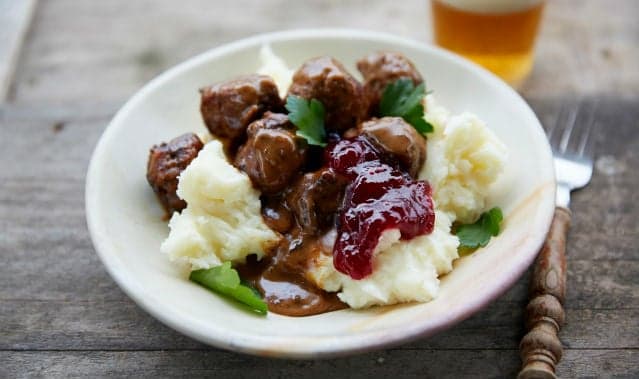Internet goes crazy when it realizes Swedish meatballs aren't Swedish

The internet has gone crazy after finding out that Swedish meatballs aren't actually Swedish, but in fact originate from Turkey.
Sweden's official Twitter account dropped the bombshell on Saturday, when it revealed that the recipe for the succulent, meaty globes was brought back by King Charles XII in the early 18th century, after he spent five years exiled in Moldova, then part of the Ottoman Empire.
Swedish meatballs are actually based on a recipe King Charles XII brought home from Turkey in the early 18th century. Let's stick to the facts! pic.twitter.com/JuTDEjq9MM
— Sweden.se (@swedense) April 28, 2018
The Turkish twittersphere reacted with glee.
"After this confession, can you give us a discount on the meatballs you sold in Ikea to win our hearts?" tweeted Turkish graphic designer Ah Ulan Zaf.
Bu itiraf sonrası gönlümüzü almak için ikeada sattığınız köftelerde indirim yapabilir misiniz?
— Ah Ulan Zaf (@Paycu) April 30, 2018
Şükrü Dirik joked that his meatball consumption should get him easy entry.
I always eat swedish meatball in ikea :) How can i do visa application to sweden https://t.co/p83kMddQlw
— Şükrü Dirik (@sukru_dirik) April 28, 2018
Others suggested that now Sweden has come clean it should stop claiming the dish as its own.
So why calling it still "Sweden meatballs?" Time to rename it!✌️
— Celal Gulluoglu (@CelalGulluoglu) April 29, 2018
The Sweden.se Twitter account pointed out that Charles XII had brought back other delicacies, including the stuffed cabbage treat kåldolmar and even coffee. The Swedish word 'kalabalik', meaning a noisy, disordered situation, is also of Turkish origin.
The global media also jumped on the story with UK papers like The Sun, Daily Telegraph, and Metro all giving it their own treatment, as did the BBC.
The Turkish media, of course loved it, with most of the main newspapers running a story on it and the Doğan News Agency even going so far as to sent a reporter to İnegöl, a town two hours outside Istanbul famous for its köfte.
"That Sweden has confessed that its meatballs come from a Turkish recipe make us proud," said Ibrahim Besler, whose family company has been making köfte for 120 years.
But while Turks were as a whole tickled by the controversy, a few Swedes seemed to take it hard.
Örjan Johansson, who is curating the @sweden account this week, seemed despondent:
My whole life has been a lie https://t.co/tVcRmJx5By
— @sweden / Örjan (@sweden) April 28, 2018
Comments (1)
See Also
Sweden's official Twitter account dropped the bombshell on Saturday, when it revealed that the recipe for the succulent, meaty globes was brought back by King Charles XII in the early 18th century, after he spent five years exiled in Moldova, then part of the Ottoman Empire.
Swedish meatballs are actually based on a recipe King Charles XII brought home from Turkey in the early 18th century. Let's stick to the facts! pic.twitter.com/JuTDEjq9MM
— Sweden.se (@swedense) April 28, 2018
The Turkish twittersphere reacted with glee.
"After this confession, can you give us a discount on the meatballs you sold in Ikea to win our hearts?" tweeted Turkish graphic designer Ah Ulan Zaf.
Bu itiraf sonrası gönlümüzü almak için ikeada sattığınız köftelerde indirim yapabilir misiniz?
— Ah Ulan Zaf (@Paycu) April 30, 2018
Şükrü Dirik joked that his meatball consumption should get him easy entry.
I always eat swedish meatball in ikea :) How can i do visa application to sweden https://t.co/p83kMddQlw
— Şükrü Dirik (@sukru_dirik) April 28, 2018
Others suggested that now Sweden has come clean it should stop claiming the dish as its own.
So why calling it still "Sweden meatballs?" Time to rename it!✌️
— Celal Gulluoglu (@CelalGulluoglu) April 29, 2018
The Sweden.se Twitter account pointed out that Charles XII had brought back other delicacies, including the stuffed cabbage treat kåldolmar and even coffee. The Swedish word 'kalabalik', meaning a noisy, disordered situation, is also of Turkish origin.
The global media also jumped on the story with UK papers like The Sun, Daily Telegraph, and Metro all giving it their own treatment, as did the BBC.
The Turkish media, of course loved it, with most of the main newspapers running a story on it and the Doğan News Agency even going so far as to sent a reporter to İnegöl, a town two hours outside Istanbul famous for its köfte.
"That Sweden has confessed that its meatballs come from a Turkish recipe make us proud," said Ibrahim Besler, whose family company has been making köfte for 120 years.
But while Turks were as a whole tickled by the controversy, a few Swedes seemed to take it hard.
Örjan Johansson, who is curating the @sweden account this week, seemed despondent:
My whole life has been a lie https://t.co/tVcRmJx5By
— @sweden / Örjan (@sweden) April 28, 2018
Join the conversation in our comments section below. Share your own views and experience and if you have a question or suggestion for our journalists then email us at [email protected].
Please keep comments civil, constructive and on topic – and make sure to read our terms of use before getting involved.
Please log in here to leave a comment.